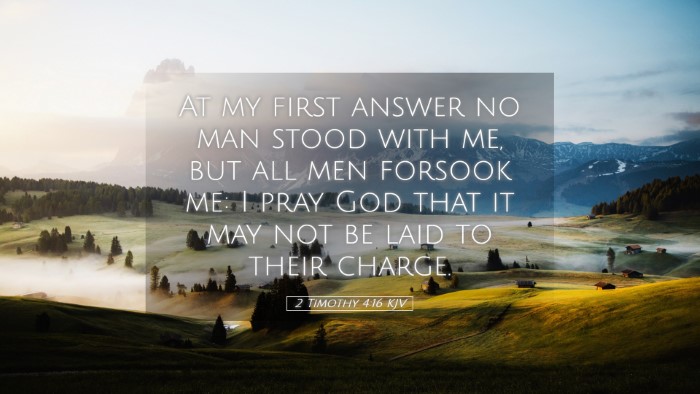Commentary on 2 Timothy 4:16
Bible Verse: "At my first answer no man stood with me, but all men forsook me: I pray God that it may not be laid to their charge." - 2 Timothy 4:16
Contextual Background
This verse occurs during a pivotal moment in Paul’s life. He faces trial and potential condemnation, expressing deep feelings of abandonment by his peers. Understanding this context is crucial for grasping the emotional weight of Paul's words.
Theological Insights
- Isolation in Ministry: Paul’s experience of standing alone reflects the isolation that often accompanies ministry, especially during trials. As Matthew Henry notes, God’s servants may find themselves forsaken, yet this experience is a reminder of the spiritual battles they face.
- Human Betrayal: Albert Barnes highlights that Paul felt the sting of betrayal from those he had labored with. In the church, unity is vital, and when that is fractured, it can lead to profound sorrow for leaders and congregants alike.
- Divine Presence in Abandonment: Adam Clarke emphasizes that despite Paul’s feeling of abandonment, he did not despair. Rather, he turned his hope toward God, illustrating a core principle of Christian faith: God is with us even when others fail us.
Paul's First Defense
The reference to "my first answer" indicates that Paul stood before a tribunal. This was his initial opportunity to defend himself against accusations. The absence of his friends points to a profound moment of vulnerability. Henry asserts that this moment was not just an isolated event but part of the ongoing spiritual warfare faced by Christians.
Reflections on Forsakenness
Paul’s lament about being forsaken by all men is echoed in the lives of many who serve in the church. Clarke draws parallels with Christ’s own experience on the cross, highlighting that even in solitude, there can be an opportunity for profound intimacy with God.
Intercession for Others
Paul’s prayer that their abandonment "may not be laid to their charge" is noteworthy. This reflects his heart of forgiveness and grace. Barnes comments on the Christian virtue of praying for one’s enemies and those who forsake us, fostering a spirit of unity and grace even in difficult times.
Lessons for Today’s Believers
- Stand Firm in Trials: Pastors, students, and theologians should draw courage from Paul’s resilience. Even in isolation, one can maintain their faith and trust in God’s sovereignty.
- Forgive and Intercede: The ability to forgive those who have forsaken us is crucial for spiritual health. Paul’s example encourages believers to pray for those who have disappointed or left them.
- Seek God’s Presence: In moments of abandonment, turning to God rather than despairing is a powerful lesson. God’s presence can bring comfort and strength, even when people fail us.
Conclusion
2 Timothy 4:16 offers a poignant reflection on the nature of ministry, the reality of human relationships, and the unwavering presence of God. By examining Paul’s experience through the lenses of these esteemed commentators, readers can glean profound insights that resonate in various contexts of church life and personal faith.


